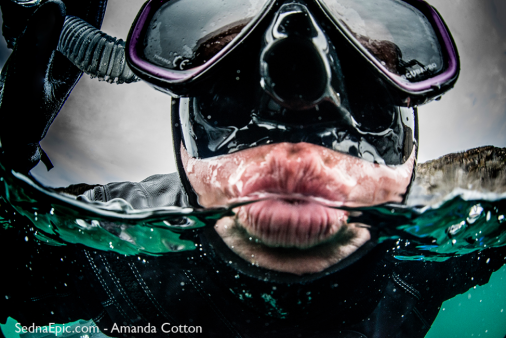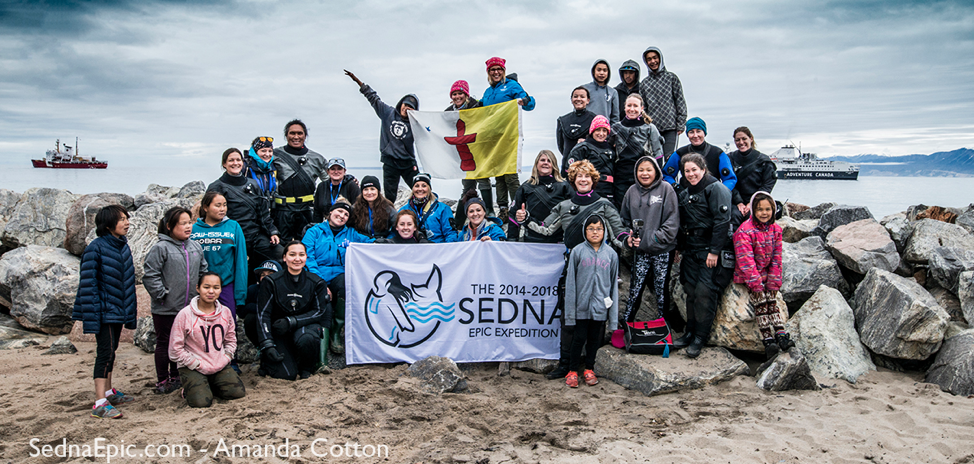Teaching Arctic Climate Change Humanities with the Sedna Epic Expedition
6 May 2019
By Kelly Patricia Bushnell.
Across Inuit Nunangat, Sedna is the Goddess of the Sea and the mother of all marine mammals. The Sedna Epic Expedition is a multi-year project in the High Arctic which brings together an interdisciplinary team of women ocean professionals focused on scouting, documenting and recording disappearing sea ice in the Arctic via snorkeling and scuba diving. In parallel, Sedna’s Sea Women run a mentorship program to empower girls and young women to tackle societal and environmental change in the Arctic.
For Team Sedna’s Summer 2018 Expedition we were scheduled to fly from Ottawa, Ontario, to Resolute, Nunavut, then sail eastward through the Northwest Passage, exploring the northeast coast of Baffin Island to the west coast of Greenland. The sea ice had other plans for our us, however, and due to upwards of 90% ice coverage in Resolute Bay on our planned departure date it was decided we would fly to Kangerlussuaq, Greenland, instead and sail north along Greenland’s western fjords then cross Davis Strait to Baffin Island and as far into the Northwest Passage as time (and ice) would permit. In the weeks that followed we acquired acoustic marine data and snorkeled and dived on sites which no one has ever seen from below the surface, sometimes in brilliantly clear water and sometimes in glacial sediment so dense we couldn’t see a (thickly gloved!) hand in front of our faces. In Sisimiut, Greenland, and Mittimatalik, Nunavut, Team Sedna facilitated underwater robot-building workshops for Inuit youth. (Since 2014, three Sedna Epic Expeditions have delivered an ocean knowledge sharing and mobilization program to more than 1,000 Inuit youths and Elders in Labrador, Nunavut, and Greenland.)
While high above the Arctic Circle at sea, on the land, and in the communities, I brainstormed with my teammates about how to bring the expedition home to my students at the University of West Florida. (An Arctic summer, for the record, is colder than a Florida winter.) Within weeks of the expedition’s conclusion I was back on campus teaching Introduction to Literature to one hundred twenty freshmen, many of whom have never left the southeastern United States. My theme for the course, as always, was “Literary Ecologies,” but for the bicentennial of Mary Shelley’s Frankenstein (1818-2018) I focused this introductory environmental literature course around the images and ideas of monstrosity and ecological annihilation. I often talk about the importance of an ecofeminist reading of the novel, but this term I also focused on its polar context. Lost in many cinematic adaptations of Frankensteinis its Arctic framing narrative, which became the focus of an entire unit of the course.
Among other Arctic texts, students connected Frankenstein to Kaijutaijuq, a 2014 short film screened at the Toronto International Film Festival starring Team’s Sedna’s advisor Johnny Issaluk. In October Johnny “visited” my class via Skype from Iqaluit, Nunavut,to answer students’ questions about the film, Inuit culture, and Arctic climate change, bringing a human face to the artistic and scientific concerns explored in the course. After Kaijutaijuqwe studied “Rise”, a recent poetic collaboration between Aka Niviana (Greenland) and Kathy Jetñil-Kijiner (Marshall Islands), organized around the ecological trajectory that Niviana’s home is melting and flooding Jetñil-Kijiner’s. The Arctic unit has become a highlight of the course, and a concrete example for students of the necessary cooperation between the humanities and the sciences in communicating the realities of anthropogenic climate change.
Students often reach the same conclusion: utterly struck by the deep unfairness that the people least responsible for climate change, who live closest to the land and have been its stewards for a thousand years, are the first to be affected by it. They also express shock and concern at the dismissive treatment of Arctic Indigenous cosmologies and knowledge systems by non-Indigenous researchers, and I extend this dismay and frustration to well-meaning researchers who pay lip service to “decolonizing” their fields without meaningfully engaging Indigenous epistemologies. (See Sheila Watt-Cloutier, “It’s Time to Listen to the Inuit on Climate Change” and Chanda Prescod-Weinstein’s “Decolonizing Science Reading List”) Team Sedna’s connections to the Arctic are onlypossible through our relationships with Arctic-based expedition partners and our Inuit advisors who graciously share their experiences and their homeland with us, and only by respecting and honoring these connections can we meaningfully cultivate a sustainable future together.

What’s next for Team Sedna? In July I’ll welcome the sea women to Seattle for PADI Women’s Dive Day, where we will certify in the operation and maintenance of Diver Propulsion Vehicles (DPVs) which will enable our ultimate goal of completing a snorkel relay of the Northwest Passage to document and raise awareness of the profound ecological change therein caused by anthropogenic climate change. In November 2019 we will host a Women’s Environmental Leadership Forum in Tromsø, Norway, which will bring together Sami, Inuit, and non-Indigenous women from Norway, Finland, the United Kingdom, Canada, the United States, and Australia to discuss the relationship between gender, environment, and leadership. We invite you follow along on our website, Facebook, Twitter, and Instagram!
Kelly Patricia Bushnell is a Seattle-based teacher, historian, and literary scholar who specializes in the environmental humanities and ecofeminism, particularly oceanic history and culture. She received her BA from the University of California (San Diego), her MA from Mills College, and her PhD from the University of London (Royal Holloway), and she has taught at the University of London and the University of West Florida. When she’s not teaching, writing, or speaking about the importance of the humanities to our ecological future, you can find her rowing a wooden boat around Puget Sound. Get in touch on Twitter @kpbushnell or at kellypbushnell.com.
- Impressions from our qualitative expert interviews on changing political priorities in the Arctic
- From ice to inspiration: A glimpse into the Arctic Circle Assembly
- Seasonal Geopolitics of the North Pole
- The Polaris expedition and the problem of bias in Arctic exploration history
- Beaches, bugs and plastic in Arctic Canada